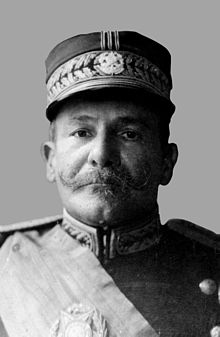Hermes da Fonseca
|
His Excellency, Marshal Hermes da Fonseca |
|
|---|---|
 |
|
| 8th President of Brazil | |
|
In office 15 November 1910 – 15 November 1914 |
|
| Vice President | Venceslau Brás |
| Preceded by | Nilo Peçanha |
| Succeeded by | Venceslau Brás |
| Minister of the Superior Military Court | |
|
In office 18 December 1908 – 27 May 1909 |
|
| Appointed by | Afonso Pena |
| Preceded by | Alexandrino Faria de Alencar |
| Succeeded by | José Maria Marinho da Silva |
| Minister of War | |
|
In office 15 November 1906 – 27 May 1908 |
|
| President | Afonso Pena |
| Preceded by | Francisco Argolo |
| Succeeded by | Luís de Morais |
| Personal details | |
| Born |
12 May 1855 São Gabriel, Rio Grande do Sul, Empire of Brazil |
| Died | 9 September 1923 (aged 68) Petrópolis, Rio de Janeiro, Brazil |
| Nationality | Brazilian |
| Political party | Conservative Republican |
| Spouse(s) | Orsina Francioni (m. 1878–1912; her death) Nair de Tefé (m. 1913–1923; his death) |
| Children | 5 |
| Religion | Roman Catholicism |
| Signature | |
| Military service | |
| Allegiance |
|
| Service/branch |
|
| Years of service | 1871–1906 |
| Rank |
|
| Commands | Police Brigade of Rio de Janeiro |
| Battles/wars | Brazilian Naval Revolts |
Hermes Rodrigues da Fonseca (Portuguese pronunciation: [ˈɛɾmis roˈdriɡis da fõˈsekɐ]; 12 May 1855 – 9 September 1923) was a Brazilian soldier and politician. The nephew of Deodoro da Fonseca, the first Brazilian President, he was the country's Minister of War in 1906. In 1910, he was elected as the 8th president of Brazil, serving until 1914.
He was on an official visit to Portugal when the revolution that overthrew the Portuguese monarchy and replaced it with a new republican regime took place.
His father was from Alagoas and served in the Brazilian Armed Forces; as part of his service, he was transferred to São Gabriel. Hermes was born in there in 1855. When his father was sent to the Paraguayan War, the family returned to Rio de Janeiro.
In 1871, at 16, he got his bachelor's degree in Science and Letters and enrolled in the Military Academy, where he was student of Benjamin Constant Botelho de Magalhães, a promoter of the ideas of Auguste Comte in Brazil. When he graduated, he served as aide-de-camp to Gaston, comte d'Eu.
He was a supporter of the republic proclaimed by his uncle Deodoro da Fonseca and was invited by the latter to be camp assistant and military secretary after the coup. During the Revolta da Armada (1893) he proved his worth in the command of the defense of Floriano Peixoto's government. He headed the Police Brigade of Rio de Janeiro from 1899 to 1904, when he assumed command of the Military Academy of Realengo.
...
Wikipedia
